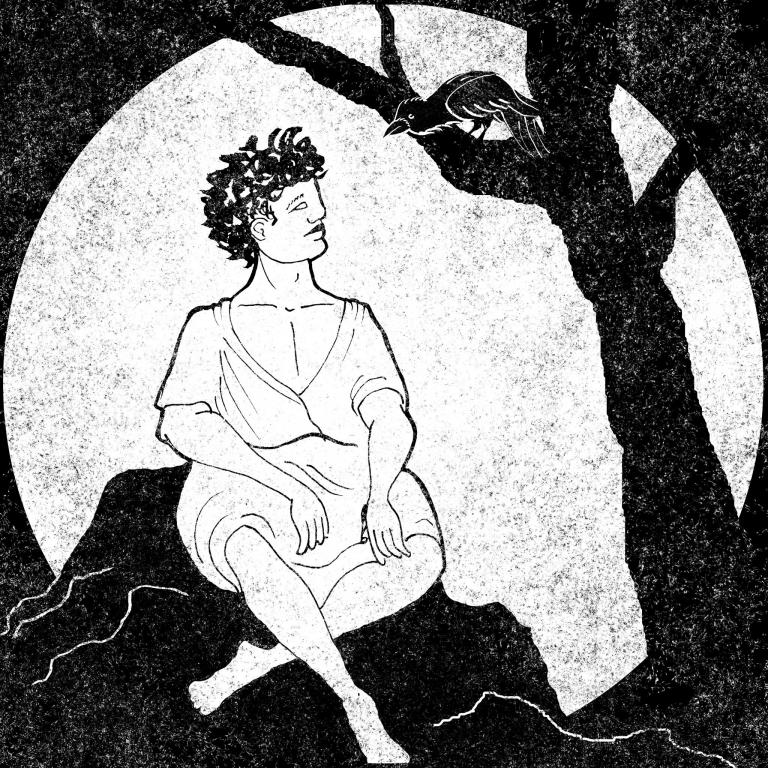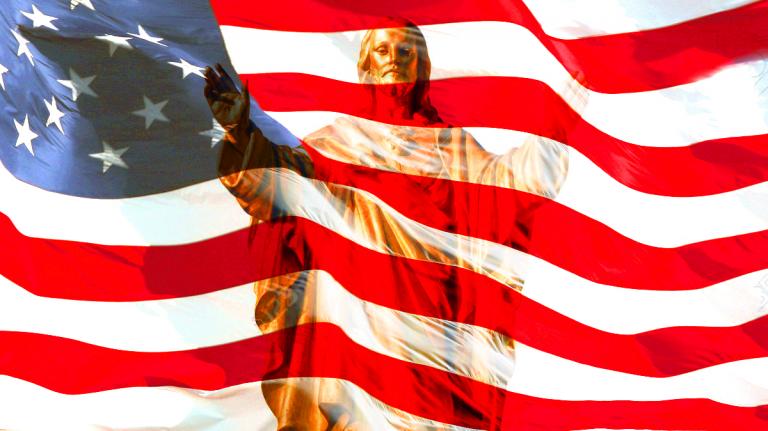
For most Christians, the Bible has a fundamentally conservative emphasis. A superficial reading of the Bible reveals a God who thinks of himself as a sort of Warrior King, who sanctions state enacted genocide, and who promotes a string of saintly kings, like King David. When Jesus arrives, it is to start a Kingdom of God that, apparently, seems content to co-exist with earthly rulership. In fact, Jesus himself says to “render to Caesar what is Caesar’s” and Paul advocates being good subjects to the governing authorities. Therefore, Christian radicalism is a contradiction in terms, right?
Furthermore, the sorts of ideas many Christian radicals hold are also glaringly unbiblical. Like nonviolence (many biblical heroes were prolific smiters). Like communism (certain patriarchs were “blessed” with vast property–which they didn’t share equally with all). Like egalitarianism (Paul tends to affirm male leadership, Jesus praises a Centurion who holds a position of authority, etc.). The Bible seems to be the enemy of liberation.
While it is outside the scope of a blog post (or book) to tackle every challenge that traditional readers of Scripture advance against radical political stances, I can offer a short overview to serve as a simple lens for seeing Scripture differently. I’ll try to note other resources for those of you who’d like to dig deeper.
To really address the myriad of issues that emerge from an radical reading of Scripture, one would be better served by a commentary series. What I’m offering here is a super simple overview, not a complete survey. If any Bible scholars out there want to publish a Radical Bible Commentary, I would not only be happy to buy a set, but also would have great ideas for who should contribute.
Let’s start at the beginning. Many read Genesis as an anti-civilizational text. It begins with the story of humans living in harmony with nature and upholds that as a pristine ideal. As Ched Myers suggests,
…in the “primeval history” of Gen 1-11 Israel’s sages—redacting older sources and probably writing in the aftermath of the failed monarchy—also attempt to explain [the rupture from primal life]. Eden can be interpreted as a mythic memory of the old symbiotic lifeways: humans, creatures and God dwell intimately and richly together (Gen 2).
From “The Fall” by Ched Myers in the Encyclopedia of Religion and Nature
When paradise is lost, humans are relegated to hard agricultural toil.
The first act of violence is committed by the agriculturalist (Cain) rather than the nomadic herdsman (Abel). As we know, agriculture emerges with the advent of civilization. It is this murderer who establishes the first city. Later, as humanity “progresses” all sorts of crazy things happen, like when human population spikes, the “sons of elohim” have sex with women, people become increasingly wicked, and God sends a flood to reboot creation. Later, when folks gather to build a huge tower that reaches to the heavens, God scatters the people. For the most part, Genesis is remarkably negative about the civilizational project and its subsequent imperializing tendencies. God even has to drown the earth to knock back the evils of civilization.
Again, Myers writes:
The “Fall” in Gen 1-11, then, is not so much a cosmic moment of moral failure as it is a progressive ‘history’ of decline into civilization—exactly contrary to the Myth of Progress. The biblical primeval history thus should be considered not only as “mythic memory,” but also as perhaps the first literature of resistance to the grand project of civilization—rightly warning against its social pathologies and ecocidal consequences.
From “The Fall” by Ched Myers in the Encyclopedia of Religion and Nature
The rest of Genesis follows the story of the first patriarchs, who YHWH has called out to become a people who will follow YHWH into a promised land. Throughout Genesis, trouble happens when the Jews favorably interact with imperial powers or try to settle too soon. While it is true that the patriarchs had many possessions, it is a stretch to infer from their wealth modern notions of property rights. Pre-agricultural nomadic peoples were tribal. While the patriarchs were hardly egalitarian, their understanding of ownership was much more communal than modern Western notions. The wealth of the tribe or clan or family was for the benefit of all. And, it would seem, that God’s vision for Jubilee would push the communality of goods and lands even further.
Every seventh year was a Sabbatical Year, during which the land is to lie fallow and agricultural activity is to cease. At the end of the year, all debts are to be forgiven. The year at the end of seven Sabbatical cycles is the year of Jubilee. At that time all land was to be redistributed back to its original owner. If these practices were kept (along with the additional stipulations to provide for aliens, widows, and others), there would be little room for economic injustice.
Exodus tells the story of a people enslaved by the Egyptian empire and how YHWH delivers them. You know the story: YHWH calls Moses (in the burning bush theophany) to lead the Israelites out of slavery into a Promised Land. Of course, once they are liberated, the people grumble and complain–desiring a return to Egypt instead of the long journey in the wilderness. In Exodus, we see a “story of Israel’s communal bonding around the mountain at which they encounter YHWH, with no need for ‘sacrifice’ of animals or enemies.” As a result of their grumbling, YHWH keeps them in the wilderness for forty years.
Then, apparently, Moses passes the mantle of leadership to Joshua—a sort of military hero who engages in war against the indigenous peoples of Canaan. The people successfully settle and are attacked by their neighbors, leading YHWH to raise up “judges” to lead the people in combat against the enemies of Israel.
YHWH sets up a brilliant economic and political reality, which will follow Jubilee economic practices and, instead of having a centralized government, will employ temporary leadership as need arises. Instead of a king, God dwells among them to rule directly rather than ruling through kings or priests. For example, one of the leaders who emerges, Gideon, tells the people, “I will not rule over you, nor will my son rule over you. The LORD will rule over you.” (Judges 8:23) Unfortunately, Gideon’s offspring attempt to set up a dynasty.
The people keep complaining for a king, and eventually YHWH relents. Saul–who fits the people’s idea of a king–sucks. He dies in battle and David (after some oft-told bible stories transpire), becomes king. The kingdom splits during the time of David’s grandson. Conflicts between the prophets and the kings become common place as Israel becomes increasingly like its neighbors, leading to the eventual demise and captivity of both the northern and southern kingdoms.
This story–from Exodus to the monarchy–is one of centralization and waywardness. As Wes Howard-Brook writes,
As it stands in its canonical order, the story conveys a relatively (and deceivingly) simple message: the shift from a twelve tribe confederacy under YHWH’s rule to a human monarchy “like the nations” (1 Sam. 8:5) was a disastrous betrayal of the unique status of Israel as YHWH’s “chosen people”…Israel “converted” from the religion of creation to the religion of empire, with predictable results.
From Wes Howard-Brook’s Come Out My People, p. 95
It is important to highlight some of what makes this a “deceivingly” simple message. It is simplistic and foolish to assume that the days of David and Solomon, with a monarchy centralized in Jerusalem and worship centralized in a Temple in Zion, should be considered a golden age. There is, according to Howard-Brook, a tension (or out-right contradiction) between the pro-monarchic “Zion Theology” that placed YHWH in the Jerusalem temple” where Solomon “could be understood as truly empowered by YHWH with ‘wisdom’” and the prophetic “Sinai theology” where “Solomon’s ‘experience’ can be written off as either wishful thinking or simply as propaganda.” In other words, the Hebrew Scriptures present a sort of argument between the religion of Empire (where a faithful, powerful, secure, wealthy and vast nation is centralized in Jerusalem, where YHWH and king dwell) and the religion of Creation (where a faithful people live in Jubilee, encounter YHWH in creation and amidst people, and live as kin without an earthly ruler).
As we read through the prophets, when God speaks, it is usually through a prophet who challenges the king’s power and who stands outside of the machines of the monarchy. So much could be said here. The emphases of the kings are very different than those of the prophets. It is astonishing how much the prophets link idolatry and exploitation of the poor. The kings often centralize wealth and power. The prophets challenge that trend. The prophets, it would seem, still hold God’s Jubilee vision in their imaginations.
One of my favorite proto-anarchist sections from the Hebrew Scriptures is Ezekiel 34. God judges the “shepherds” or rulers of Israel, essentially striking them down to become the people’s sole Shepherd. Incidentally, this may be the passage that Jesus had in mind in his “sheep and goats” story in Matthew 25. Here’s a choice quote:
I myself will feed my sheep and I myself will
Ezekiel 34:15-16
make them lie down, declares the sovereign
Lord. I will seek the lost and bring back the
strays; I will bandage the injured and
strengthen the sick, but the fat and the strong
I will destroy. I will feed them–with
judgment!















